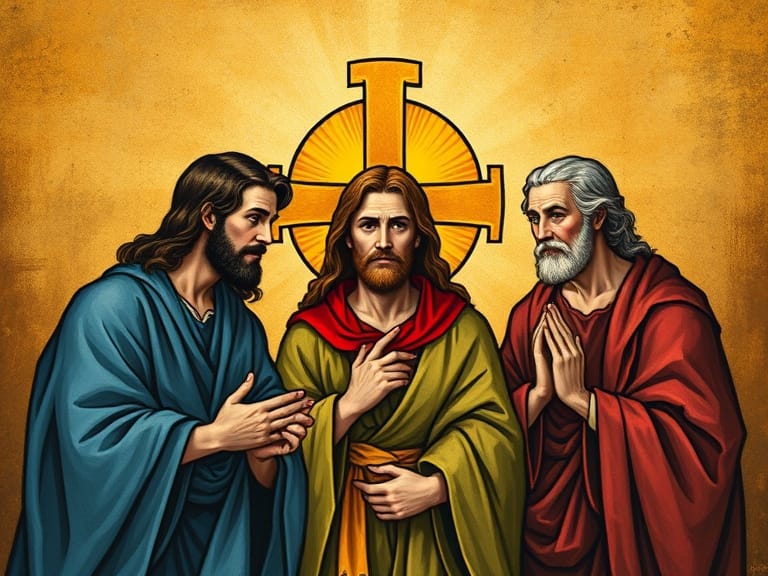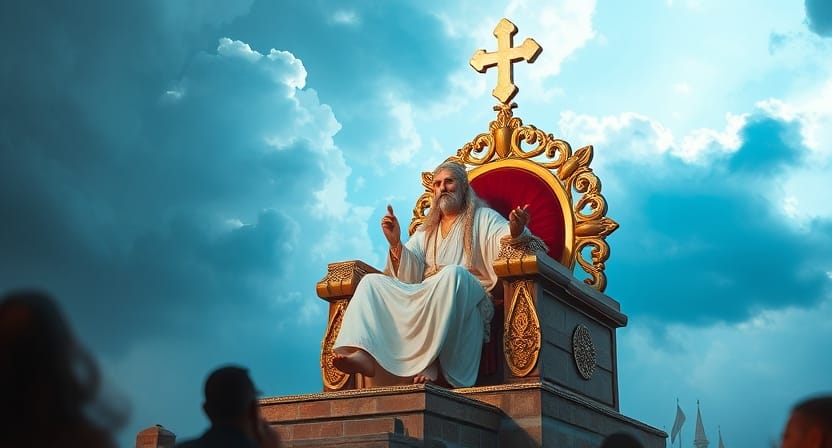Jesus the Messiah- Introduction
The concept of Jesus the Messiah (meaning “Anointed One”) plays a central role in the religious thought of Judaism, Christianity, and Islam, with significant variations in understanding across these faiths. Below is an in-depth, researched study on the figure of the Messiah, exploring its origins, theological implications, and evolution across the Abrahamic religions.
1. The Origin of the Term “Messiah”
The Hebrew word mashiach (מָשִׁיחַ) translates to “anointed one,” originally referring to a person anointed with holy oil for a specific purpose, typically a king, priest, or prophet (1 Samuel 10:1; Leviticus 4:3, 5:12). In the Old Testament (Hebrew Bible), the term was used to designate both secular and religious figures who were chosen and consecrated by God. For instance:
- Kings: David is frequently referred to as the “Lord’s anointed” (1 Samuel 24:6), illustrating the king’s role as God’s chosen leader of the nation of Israel.
- Priests and Prophets: The term also applied to those anointed for religious purposes (Leviticus 4:3).
Over time, however, the term Messiah became associated with a future, eschatological figure who would bring salvation to the Jewish people.
2. The Messiah in Judaism

A. The Messianic Prophecies in the Hebrew Bible
In Judaism, the Messiah is envisioned as a future king from the Davidic line, anointed by God to bring an era of peace, justice, and prosperity. This expectation was influenced by several prophetic writings in the Hebrew Bible:
- Isaiah 9:6-7: A ruler will come who will establish peace and justice.
- Jeremiah 23:5-6: A righteous branch from David’s line will reign wisely and justly.
- Ezekiel 37:24-28: A future Davidic king will unite Israel and Judah, restore the Temple, and establish an eternal covenant.
B. Messianic Expectations in the Second Temple Period
During the Second Temple period (516 BCE – 70 CE), various Jewish groups had differing views of the Messiah:
- Pharisees: Emphasized the coming of a righteous, Davidic king who would restore Israel and bring about an age of peace.
- Sadducees: Focused more on temple rituals and the priestly order, with less emphasis on the Messianic figure.
- Essenes: Expected a priestly and possibly royal Messiah, but they also anticipated two Messiahs—one royal and one priestly—who would restore Israel.
- Zealots: Believed the Messiah would be a militant leader who would overthrow Roman rule.
C. Messianic Expectations Today
In contemporary Judaism, the Messiah is still awaited. The Jewish view is that the Messiah has not yet come, and his arrival will usher in an era of peace, the ingathering of exiles, and the rebuilding of the Temple in Jerusalem.
3. The Messiah in Christianity
In Christian theology, Jesus Christ is considered the fulfilment of Messianic prophecy, although the understanding of the Messiah diverges significantly from Jewish expectations.
A. Jesus the Messiah
Christianity teaches that Jesus (Jesus the Messiah) of Nazareth is the long-awaited Messiah. Key aspects of Jesus’ Messianic role in Christian belief include:
- The Davidic Line: Christians believe that Jesus, through his earthly mother, Mary, was a descendant of King David (Matthew 1:1-16), fulfilling the promise of a Davidic Messiah.
- Suffering Servant: Unlike the Jewish expectation of a militant or political Messiah, Christians believe Jesus fulfilled the prophecy of the suffering servant in Isaiah 53, where the Messiah would suffer for the sins of others.
- A New Covenant: Jesus established a new covenant through his death and resurrection, offering salvation not just to Israel but to all humanity (Matthew 26:28; Luke 22:20).
- Fulfilment of Prophecy: The New Testament writers argue that Jesus’ life, death, and resurrection fulfilled numerous Old Testament prophecies regarding the Messiah (Matthew 1:22-23; Luke 24:44).
B. The Kingdom of God
One of Jesus’ key teachings about his Messianic mission was the establishment of the Kingdom of God—an eternal kingdom not of this world (John 18:36). This contrasts with the Jewish expectation of a political kingdom that would restore Israel’s sovereignty.
C. The Second Coming
While Christians believe Jesus inaugurated the Kingdom of God, they also await his Second Coming, where he will fully realize the Messianic prophecies, bringing justice, peace, and the resurrection of the dead.
4. The Messiah in Islam
In Islam, the Messiah is known as Isa ibn Maryam (Jesus, son of Mary), and he is viewed as a significant figure in the eschatological events that will occur before the Day of Judgment.
A. Jesus as the Messiah in Islam
The Quran refers to Jesus as the Masih (Messiah), but his role differs from that in Christianity. Muslims believe that Jesus was a prophet, not divine, and that he performed miracles, healed the sick, and brought guidance to the people of Israel (Quran 3:45-51, 5:110). However:
- Jesus’ Crucifixion: Islam teaches that Jesus was not crucified but instead was raised up by God. Another person was made to appear as Jesus, and thus, Jesus did not die on the cross (Quran 4:157-158).
- Return of Jesus: Muslims believe that Jesus will return in the future as a key figure in the final judgment. He will defeat the false Messiah (the Dajjal or Antichrist), establish peace, and rule justly before the Day of Judgment (Quran 43:61).
B. Messianic Role in Islamic Eschatology
In Islam, Jesus’ return is a central part of Islamic eschatology. His return will coincide with the defeat of evil and the establishment of righteousness and justice.
5. Messianic Figures and Movements Throughout History
Over the centuries, various individuals have been seen by some as claiming to be the Messiah. Notable examples include:
- Shabbetai Zevi (1626-1676): A Jewish rabbi who declared himself the Messiah, leading to a messianic movement that ended in his conversion to Islam.
- The Baháʼí Faith: The founder, Bahá’u’lláh, is considered by followers to be the fulfilment of messianic prophecies in various religions, including Judaism, Christianity, and Islam.
These movements, though not universally accepted, demonstrate the ongoing human desire for the fulfilment of Messianic hopes.
6. Theological Implications and Debates
The Messiah represents not just a political or spiritual leader, but an embodiment of God’s intervention in the world. Theologically, the concept raises several important questions:
- Messiah and Divine Nature: In Christianity, the Messiah is both fully human and fully divine, a central element of Christian theology. This is in contrast to the Jewish and Islamic views of the Messiah as strictly human.
- The Nature of Salvation: In Christianity, the Messiah’s role is not only to rule but to bring salvation through his sacrificial death. In contrast, Judaism anticipates a political and spiritual restoration through the Messiah, and in Islam, Jesus’ role is that of a prophet and guide to righteous living.
Jesus the Messiah: An In-Depth Exploration
The concept of the Messiah is central to the religious frameworks of Judaism, Christianity, and Islam. In Christianity, Jesus of Nazareth is understood to be the fulfilment of the Messianic prophecies in the Hebrew Scriptures. This exploration focuses on understanding Jesus as the Messiah, the role he plays in Christian theology, and how his Messianic identity was both fulfilled in his life and continues to have eschatological significance.
1. The Messiah in the Hebrew Scriptures (Old Testament)
In Judaism, the Messiah (from the Hebrew mashiach, meaning “anointed one”) is a future leader who is expected to bring redemption, establish peace, and fulfill God’s promises to Israel. The concept of the Messiah is grounded in the Hebrew Bible, particularly in the following areas:
- Davidic Line: The Messiah was anticipated to be a descendant of King David, as seen in passages like Isaiah 11:1-10 and Jeremiah 23:5. This Messiah would restore Israel to its former glory, both politically and spiritually.
- Peace and Justice: Passages like Isaiah 9:6-7 and Micah 4:1-4 predict a time when the Messiah will establish global peace, end war, and bring justice to the nations.
- Suffering Servant: In Isaiah 53, the “suffering servant” is described, a figure who would bear the sins of the people, leading to redemption.
These prophecies set the foundation for the Jewish expectation of a Messiah who would restore Israel and usher in an era of peace.
2. Jesus as the Fulfilment of the Messiah in Christianity
A. Jesus the Messiah– Identity
In Christian theology, Jesus is understood to be the Messiah promised in the Hebrew Scriptures. Christians believe that Jesus fulfilled the Messianic prophecies, but in ways that differed from traditional Jewish expectations. Instead of being a political leader who would overthrow oppressors, Jesus’ mission was to bring spiritual salvation through his teachings, death, and resurrection.
Key passages that link to Jesus the Messianic prophecy include:
- Matthew 1:1-16: The genealogy of Jesus demonstrates his Davidic lineage, establishing him as a legitimate heir to the throne of David.
- Matthew 16:15-16: Peter confesses that Jesus is the Messiah, the Son of the living God.
- Luke 4:16-21: Jesus reads from the book of Isaiah and declares that the prophecy of the Messiah, who would bring good news to the poor and set captives free, is fulfilled in him.
B. Jesus and the Kingdom of God
One of the key elements of Jesus’ Messianic role was his proclamation of the Kingdom of God. Unlike the Jewish expectation of a political kingdom, Jesus’ teaching emphasized a spiritual kingdom. According to the Gospels:
- Mark 1:15: Jesus proclaims, “The time has come…the kingdom of God has come near. Repent and believe the good news.”
- John 18:36: When questioned by Pilate, Jesus says, “My kingdom is not of this world.”
Jesus’ Kingdom is not about earthly rule but about God’s reign in the hearts and lives of believers, establishing peace and justice through love and grace.
C. The Suffering : Jesus the Messiah
The most striking aspect of Jesus’ Messiahship, according to Christian belief, is his role as the suffering servant. Whereas Jewish expectations held that the Messiah would conquer enemies and restore Israel’s power, Jesus’ death on the cross redefined what it meant to be the Messiah:
- Isaiah 53:3-5: The Messiah is described as one who suffers for the sins of others.
- Luke 22:19-20: During the Last Supper, Jesus institutes the Eucharist, symbolizing his body and blood given for the forgiveness of sins.
For Christians, Jesus’ death on the cross is the ultimate expression of his Messianic mission—to offer salvation and reconciliation with God.

3. The Death, Resurrection, and Ascension of Jesus
A. Jesus the Messiah: The Crucifixion
The crucifixion of Jesus is central to Christian understanding of the Messiah. Christians believe that Jesus’ sacrifice on the cross was a substitutionary atonement for the sins of humanity. This event is not just a tragedy but a divine act of salvation.
- Matthew 27:45-50: Jesus dies on the cross, and the temple veil is torn, symbolizing the end of the old covenant and the beginning of a new relationship between God and humanity.
B. Jesus the Messiah: The Resurrection
The resurrection of Jesus is the cornerstone of Christian faith. Christians believe that through his resurrection, Jesus defeated sin and death and inaugurated the promise of eternal life for all believers.
- Matthew 28:1-10: Jesus rises from the dead on the third day, fulfilling his own prophecy.
- 1 Corinthians 15:17: Paul asserts, “If Christ has not been raised, your faith is futile; you are still in your sins.”
The resurrection is seen as a validation of Jesus’ identity as the Messiah and marks the beginning of God’s Kingdom on earth.
C. Jesus the Messiah: The Ascension
After appearing to his disciples for forty days following his resurrection, Jesus ascended into heaven. The ascension marks the completion of Jesus’ earthly ministry and his exaltation to the right hand of God.
- Acts 1:9-11: Jesus is taken up into the clouds, and two angels proclaim that he will return in the same way.
- Matthew 28:18-20: Jesus commissions his disciples to go into all the world and make disciples, a commission that is empowered by his authority as the risen Messiah.
4. The Messianic Role of Jesus in Christian Eschatology
A. Jesus the Messiah: The Return
While Christians believe that Jesus inaugurated the Kingdom of God, they also anticipate his return to fully establish God’s rule on earth. This event is known as the Second Coming.
- Revelation 19:11-16: Jesus returns as the conquering king, defeating evil and establishing God’s eternal kingdom.
- Matthew 24:30-31: Jesus speaks of his return, where “all the nations of the earth will mourn” and the Son of Man will come in glory.
B. The Final Judgment
In Christian theology, the Second Coming will include a final judgment where all people will be judged according to their deeds. Jesus will be the judge, separating the righteous from the wicked.
- Matthew 25:31-46: The parable of the sheep and the goats illustrates the criteria for judgment.

Conclusion
The figure of the Messiah is a cornerstone of faith in Judaism, Christianity, and Islam, with each tradition developing its own understanding and expectations. In Judaism, the Messiah is a future political and spiritual leader who will restore Israel and bring peace. Christianity sees Jesus as the fulfilment of Messianic prophecy, focusing on his role as the Savior and the bringer of the Kingdom of God. Islam acknowledges Jesus as the Messiah but emphasizes his role as a prophet and looks forward to his return in the end times.
The figure of the Messiah represents hope, redemption, and divine intervention in human history. Understanding the Messiah’s role in each of these traditions offers insight into the diverse ways in which different faiths seek to understand God’s interaction with the world.
In both the Jewish and Christian traditions, the Messiah is a pivotal figure representing divine intervention and the fulfilment of God’s promises. For Judaism, the Messiah is still anticipated as a future king from the Davidic line who will restore Israel, establish peace, and bring justice to the world. The Messiah in Judaism is expected to bring about the physical redemption of the Jewish people and the entire world.
In Christianity, however, Jesus (Jesus the Messiah) of Nazareth is recognized as the fulfilment of these Messianic prophecies. Christians believe that Jesus, through his life, teachings, death, and resurrection, fulfilled the expectations of the Messiah, though in a way that transcended Jewish anticipation. Rather than a political figure who would free Israel from oppression, Jesus’ role as the Messiah was centered around bringing spiritual salvation to humanity, establishing the Kingdom of God in the hearts of believers, and offering eternal life through his death and resurrection.
The death of Jesus the Messiah on the cross, his resurrection, and the promise of his return in the Second Coming mark the heart of Christian faith and demonstrate how Jesus redefined the role of the Messiah. His life and mission revealed a radically different understanding of what it means to be the Messiah: not just a conqueror, but a suffering servant who bears the sins of the world.
In conclusion, while Judaism and Christianity share a common foundation in the figure of the Messiah, their interpretations diverge significantly. For Christians, Jesus is the Messiah, the Anointed One who fulfilled the hopes of Israel and the world. His return is awaited to fully establish God’s eternal reign. Understanding Jesus as the Messiah enriches both religious traditions and highlights the centrality of his message in both the fulfilment of ancient prophecy and the promise of future redemption.
Key Resources for Further Study:
- BibleGateway:. www.biblegateway.com
- The Life and Times of Jesus the Messiah by Alfred Edersheim: A classic work that explores the historical and cultural background of Jesus’ life and mission.
- “Jesus the Messiah: Tracing the Promises, Expectations, and Coming of Israel’s King” by Michael Rydelnik: A comprehensive Christian exploration of Jesus as the fulfilment of Messianic prophecies.
- The Jesus Seminar: www.jesusseminar.org.
